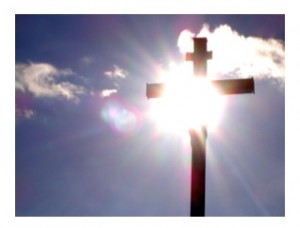 The title seems a bit ironic. The image of Good Friday: the crucified Jesus, suffering untold physical, mental, and spiritual agonies, hardly brings to mind the word “healing.” “Pick up your daily cross and follow me,” says Jesus. But wouldn’t we sometimes like to just throw that cross down? Healing is the furthest idea from our consciousness when the cross “strikes.” And yet our own personal crosses can be exactly that.
The title seems a bit ironic. The image of Good Friday: the crucified Jesus, suffering untold physical, mental, and spiritual agonies, hardly brings to mind the word “healing.” “Pick up your daily cross and follow me,” says Jesus. But wouldn’t we sometimes like to just throw that cross down? Healing is the furthest idea from our consciousness when the cross “strikes.” And yet our own personal crosses can be exactly that.
It may help us to know that God allows, or lays on our shoulders, three distinct types of crosses, each of which brings us into a deeper spiritual level of union with Him, and thus deeper healing for our souls.
The first level of the cross is synonymous with what the Bible describes as the Lord’s discipline, as in the letter to the Hebrews, Chapter 12:5b-6a: “My son, do not disdain the discipline of the Lord or lose heart when reproved by him; for whom the Lord loves, he disciplines.”
This kind of cross can feel like a spank. God, in His loving, providential care, inserts his hand into the world and takes direct action in our lives, or He allows the consequences of our actions to unfold naturally in a cause and effect manner. Through action or allowance, He attempts to wake us up to the harm we’re causing ourselves or others, in the hope that we’ll stop sinning in a particular way. Examples might be: we’re caught cheating; we’re humbled and our human pride is bruised; we’re shown, in full color, that an error we’ve embraced isn’t true; we have the “hell” scared out of us when we’re about to do something we shouldn’t; we don’t treat our body as a temple of the Holy Spirit and suffer the consequences; and so on.
“At the time, all discipline seems a cause not for joy but for pain, yet later it brings the peaceful fruit of righteousness to those who are trained by it. So strengthen your drooping hands and your weak knees. Make straight paths for your feet, that what is lame may not be dislocated but healed.” (Hebrews, Chapter 12: 11-13)
The second spiritual level of the Cross is when God allows us to experience certain pains and struggles in our lives, so that we might come closer to Him and grow in virtue. What person develops incredible patience who hasn’t dealt with trying situations? What person develops the gift of long-suffering who hasn’t suffered? What person learns how to forgive who has never been wronged?
These second level crosses of random, unwanted difficulties in life are hard to understand and sometimes feel unbearable—a random injury strikes, someone dies, a job is lost, a pipeline breaks, harsh words fly, a spouse cheats, a false rumor spreads. When these crosses come upon us, we often seek an escape route. Crushed under their weight of physical pain, relationship pain, family pain, financial pain, constant pain, we can be tempted to despair. We ask Why? Why this? Why me? Why now? Nothing seems to make sense, and sometimes we feel pushed too far and our cross comes crashing to the ground.
A lot of drug or alcohol addictions, food addictions, divorces, lawsuits, breast implants, selfish spending, family rifts, neglected grandparents, abortions, cheating on our taxes, lost vocations and you name it happen when we throw a cross down and think that by doing so, we can pick up a lighter one. But in the long run, we only make our cross heavier and miss the chance to grow spiritually.
A story called, “The teacup” (click here to read), illustrates beautifully well the healing power within this second spiritual level of the cross. What a mystery is this! In the midst of such painful, even scary times, we can feel like our very bones are being crushed and our soul is stretched far beyond its capacity. Yet God is perfecting us and making our souls beautiful. If we weather the storm and don’t rebel against it, we allow God to create us anew. The key to our healing is trust—trust in God, even in the absolute unknown. When this happens to you, trust that He is healing your soul, trust that He will never let you suffer in vain, trust that He is giving you virtues, making you into a saint and saving others through you. Only through trust can your cross become lighter and spur you headlong into God.
The third spiritual level of the cross is not involuntary, like the first and second levels. This third level is attained when we voluntarily pick up a cross in order to help heal souls and bring the kingdom of God to earth. This spiritual level is what Lent is all about, when we practice almsgiving, works of mercy, prayer, and fasting.
Life does not impose these practices upon us. They are always freely chosen. It is the human being, imbued with grace, knowingly or unknowingly imitating the life of Jesus, who gives of himself or herself freely in this way.
We can be fooled into thinking that voluntarily sacrifice will simply bring more suffering into our lives, and certainly suffering can be involved when we write that check to our favorite charity, unsure of our own financial situation; when we reluctantly turn of an enticing television show in order to pick up a Bible; when we scrape tired bones off the couch to visit a prison or a rest home; when we play our child’s favorite game for the hundredth time; when give up our favorite food and drink, or fast on just bread and water (see article on fasting)—all on behalf of pulling graces down from heaven and splashing them on our world. These practices require a moment of sacrifice, maybe even the feeling of suffering, but it is fleeting, for ultimately, our efforts help us receive and give more love. And love is the most healing thing in the world.
A striking example of the healing power of the cross is Jaime Jaramillo, affectionately known as Papa Jaime in his home country of Colombia. Papa Jaime is one of the stories in a book I wrote called Full of Grace: Miraculous Stories of Healing and Conversion through Mary’s Intercession. For many years now, he has single-handedly rescued children who actually live in the underground sewer canals of Colombia. Again and again, he picks up his cross and enters the sewers. Here’s how he speaks of his experience.
When I patrol the streets in a rescue effort, I pass through dire poverty and hopelessness; when I descend underground, I enter into a surrealistic place of sickening darkness and endless nights, where children still wait to be rescued. There I see no love, no light, no affection—only desperation as they search in vain for consolation, for hope, for a hug, for a word of kindness. Yet there I find joy; I find my calling. I never draw attention to the hellish conditions in which the children live, nor do I treat them with pity. I act as though their surroundings were completely normal. My focus is on how I can help them. What moves me is love, and love is what can heal them.
Once when I was rescuing children from a sewer in Bogotá, I came up to the surface with my clothes wet and foul, and some people came up to me to tell me that they wouldn’t do that for a million pesos, and that they considered me a saint. I replied that I wasn’t a saint, nor would I do it for a million pesos, but that I enjoyed doing it because I did not act out of fear but love. My work for the foundation has always been, and will always be, only as a volunteer. I don’t receive any money from it. In 1990, I was nominated for the Nobel Peace Prize, but I preferred to be busy helping the children instead of filling out all that paperwork, so I decided not to enter my name.
When you love what you do and do what you love, you aren’t working, but only enjoying the richness of life. Rescuing the children is not a sacrifice for me. Nor does it imply any kind of suffering to find myself inside a sewer, surrounded by death and loneliness, because the sight of a boy or a girl with a full belly and a happy heart, with eyes filled with hope and faith, is a gift that gives me the greatest joy. My spirit, which feeds on service, can rejoice and vibrate with peace and happiness. (Full of Grace, pp. 90-91)
Jesus picked up His cross, and He redeemed the world. And not only that, He appeared whole, resurrected, beautiful! In the end, the holes in his hands and feet and side no longer hurt Him. They were simply symbols of his love.
In the end, with paradise as our goal, all of our crosses will one day cease to cause us any pain. They will be gems in our crown, symbols of how much we loved. And we will stand whole and healthy, perfectly healed and radiantly happy, absorbed in the very essence of God.
Copyright 2011 Christine Watkins
About the Author

Christine Watkins
Christine Watkins, inspirational speaker and author, was saved from death and atheism, through a miracle of divine grace. She is the founder of QueenOfPeaceMedia.com, the author of TRANSFIGURED: Patricia Sandoval's Escape from Drugs, Homelessness, and the Back Doors of Planned Parenthood and Full of Grace: Miraculous Stories of Healing and Conversion through Mary’s Intercession. See ChristineWatkins.com, and visit QueenOfPeaceMedia.com.


.png?width=1806&height=731&name=CatholicMom_hcfm_logo1_pos_871c_2728c%20(002).png)
Comments